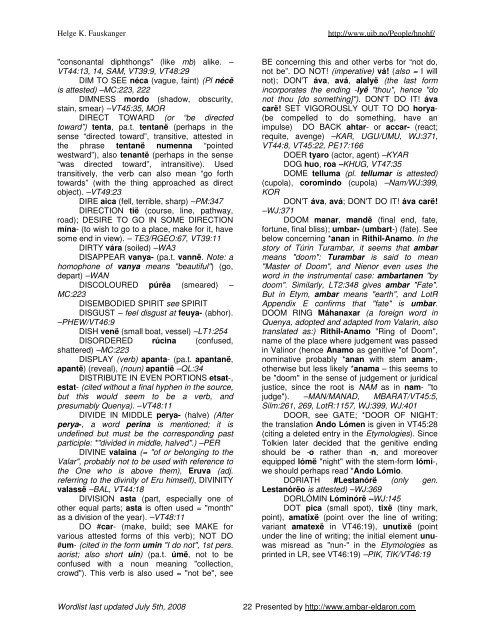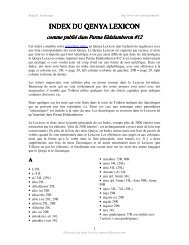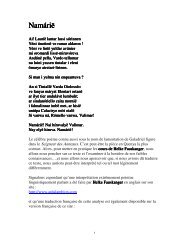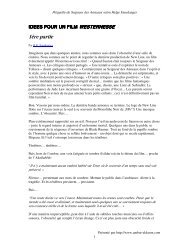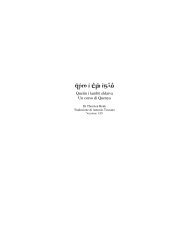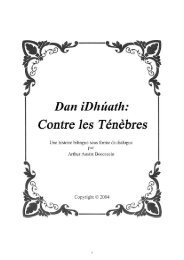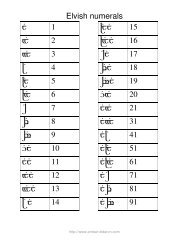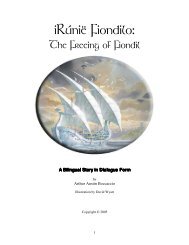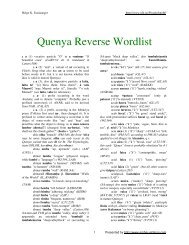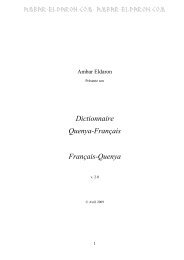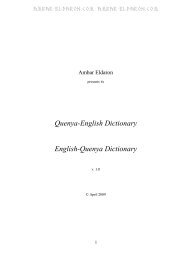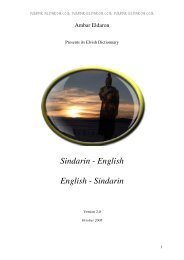English – Quenya - Ambar Eldaron
English – Quenya - Ambar Eldaron
English – Quenya - Ambar Eldaron
You also want an ePaper? Increase the reach of your titles
YUMPU automatically turns print PDFs into web optimized ePapers that Google loves.
Helge K. Fauskanger http://www.uib.no/People/hnohf/<br />
"consonantal diphthongs" (like mb) alike. <strong>–</strong><br />
VT44:13, 14, SAM, VT39:9, VT48:29<br />
DIM TO SEE néca (vague, faint) (Pl nécë<br />
is attested) <strong>–</strong>MC:223, 222<br />
DIMNESS mordo (shadow, obscurity,<br />
stain, smear) <strong>–</strong>VT45:35, MOR<br />
DIRECT TOWARD (or “be directed<br />
toward”) tenta, pa.t. tentanë (perhaps in the<br />
sense “directed toward”, transitive, attested in<br />
the phrase tentanë numenna “pointed<br />
westward”), also tenantë (perhaps in the sense<br />
“was directed toward”, intransitive). Used<br />
transitively, the verb can also mean “go forth<br />
towards” (with the thing approached as direct<br />
object). <strong>–</strong>VT49:23<br />
DIRE aica (fell, terrible, sharp) <strong>–</strong>PM:347<br />
DIRECTION tië (course, line, pathway,<br />
road); DESIRE TO GO IN SOME DIRECTION<br />
mína- (to wish to go to a place, make for it, have<br />
some end in view). <strong>–</strong> TE3/RGEO:67, VT39:11<br />
DIRTY vára (soiled) <strong>–</strong>WA3<br />
DISAPPEAR vanya- (pa.t. vannë. Note: a<br />
homophone of vanya means "beautiful") (go,<br />
depart) <strong>–</strong>WAN<br />
DISCOLOURED púrëa (smeared) <strong>–</strong><br />
MC:223<br />
DISEMBODIED SPIRIT see SPIRIT<br />
DISGUST <strong>–</strong> feel disgust at feuya- (abhor).<br />
<strong>–</strong>PHEW/VT46:9<br />
DISH venë (small boat, vessel) <strong>–</strong>LT1:254<br />
DISORDERED rúcina (confused,<br />
shattered) <strong>–</strong>MC:223<br />
DISPLAY (verb) apanta- (pa.t. apantanë,<br />
apantë) (reveal), (noun) apantië <strong>–</strong>QL:34<br />
DISTRIBUTE IN EVEN PORTIONS etsat-,<br />
estat- (cited without a final hyphen in the source,<br />
but this would seem to be a verb, and<br />
presumably <strong>Quenya</strong>). <strong>–</strong>VT48:11<br />
DIVIDE IN MIDDLE perya- (halve) (After<br />
perya-, a word perina is mentioned; it is<br />
undefined but must be the corresponding past<br />
participle: *"divided in middle, halved".) <strong>–</strong>PER<br />
DIVINE valaina (= "of or belonging to the<br />
Valar", probably not to be used with reference to<br />
the One who is above them), Eruva (adj.<br />
referring to the divinity of Eru himself), DIVINITY<br />
valassë <strong>–</strong>BAL, VT44:18<br />
DIVISION asta (part, especially one of<br />
other equal parts; asta is often used = "month"<br />
as a division of the year). <strong>–</strong>VT48:11<br />
DO #car- (make, build; see MAKE for<br />
various attested forms of this verb); NOT DO<br />
#um- (cited in the form umin "I do not", 1st pers.<br />
aorist; also short uin) (pa.t. úmë, not to be<br />
confused with a noun meaning "collection,<br />
crowd"). This verb is also used = "not be", see<br />
BE concerning this and other verbs for “not do,<br />
not be”. DO NOT! (imperative) vá! (also = I will<br />
not); DON'T áva, avá, alalyë (the last form<br />
incorporates the ending -lyë "thou", hence "do<br />
not thou [do something]"). DON'T DO IT! áva<br />
carë! SET VIGOROUSLY OUT TO DO horya-<br />
(be compelled to do something, have an<br />
impulse) DO BACK ahtar- or accar- (react;<br />
requite, avenge) <strong>–</strong>KAR, UGU/UMU, WJ:371,<br />
VT44:8, VT45:22, PE17:166<br />
DOER tyaro (actor, agent) <strong>–</strong>KYAR<br />
DOG huo, roa <strong>–</strong>KHUG, VT47:35<br />
DOME telluma (pl. tellumar is attested)<br />
(cupola), coromindo (cupola) <strong>–</strong>Nam/WJ:399,<br />
KOR<br />
DON'T áva, avá; DON'T DO IT! áva carë!<br />
<strong>–</strong>WJ:371<br />
DOOM manar, mandë (final end, fate,<br />
fortune, final bliss); umbar- (umbart-) (fate). See<br />
below concerning *anan in Rithil-Anamo. In the<br />
story of Túrin Turambar, it seems that ambar<br />
means "doom": Turambar is said to mean<br />
"Master of Doom", and Nienor even uses the<br />
word in the instrumental case: ambartanen "by<br />
doom". Similarly, LT2:348 gives ambar "Fate".<br />
But in Etym, ambar means "earth", and LotR<br />
Appendix E confirms that "fate" is umbar.<br />
DOOM RING Máhanaxar (a foreign word in<br />
<strong>Quenya</strong>, adopted and adapted from Valarin, also<br />
translated as:) Rithil-Anamo "Ring of Doom",<br />
name of the place where judgement was passed<br />
in Valinor (hence Anamo as genitive "of Doom",<br />
nominative probably *anan with stem anam-,<br />
otherwise but less likely *anama <strong>–</strong> this seems to<br />
be "doom" in the sense of judgement or juridical<br />
justice, since the root is NAM as in nam- "to<br />
judge"). <strong>–</strong>MAN/MANAD, MBARAT/VT45:5,<br />
Silm:261, 269, LotR:1157, WJ:399, WJ:401<br />
DOOR, see GATE; *DOOR OF NIGHT:<br />
the translation Ando Lómen is given in VT45:28<br />
(citing a deleted entry in the Etymologies). Since<br />
Tolkien later decided that the genitive ending<br />
should be -o rather than -n, and moreover<br />
equipped lómë "night" with the stem-form lómi-,<br />
we should perhaps read *Ando Lómio.<br />
DORIATH #Lestanórë (only gen.<br />
Lestanórëo is attested) <strong>–</strong>WJ:369<br />
DORLÓMIN Lóminórë <strong>–</strong>WJ:145<br />
DOT pica (small spot), tixë (tiny mark,<br />
point), amatixë (point over the line of writing;<br />
variant amatexë in VT46:19), unutixë (point<br />
under the line of writing; the initial element unu-<br />
was misread as "nun-" in the Etymologies as<br />
printed in LR, see VT46:19) <strong>–</strong>PIK, TIK/VT46:19<br />
Wordlist last updated July 5th, 2008 22 Presented by http://www.ambar-eldaron.com


